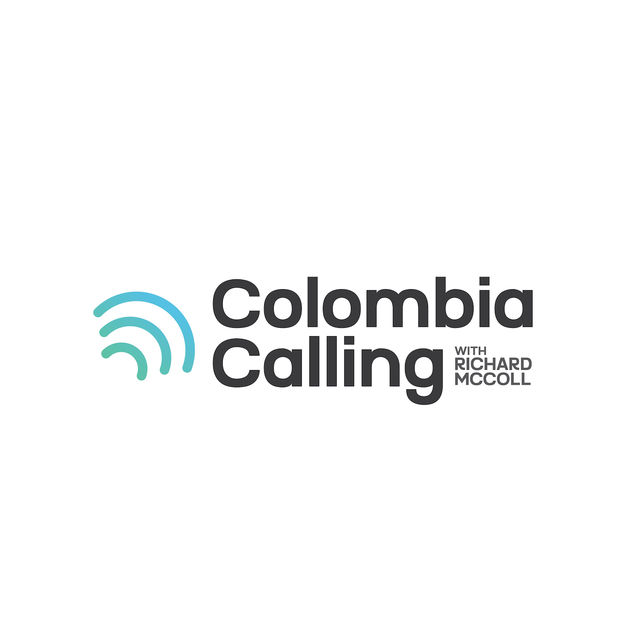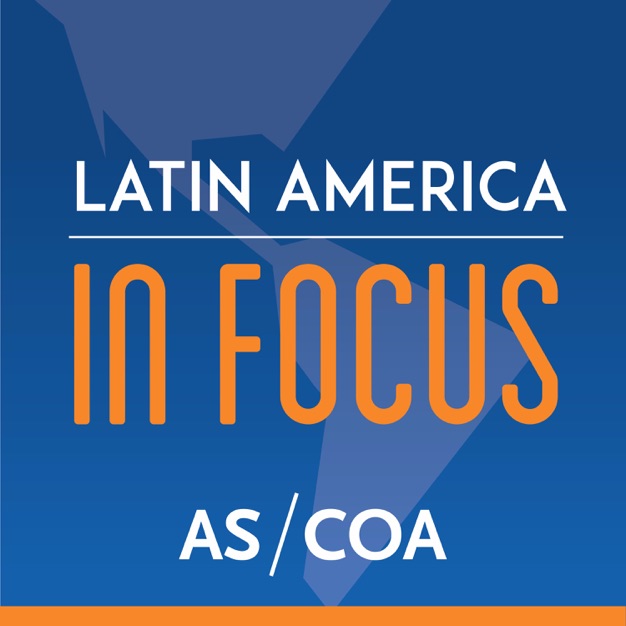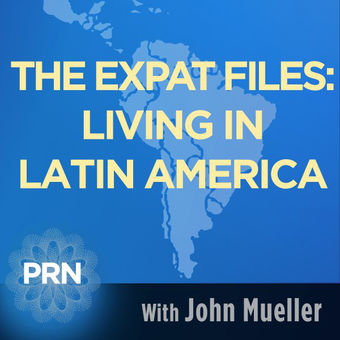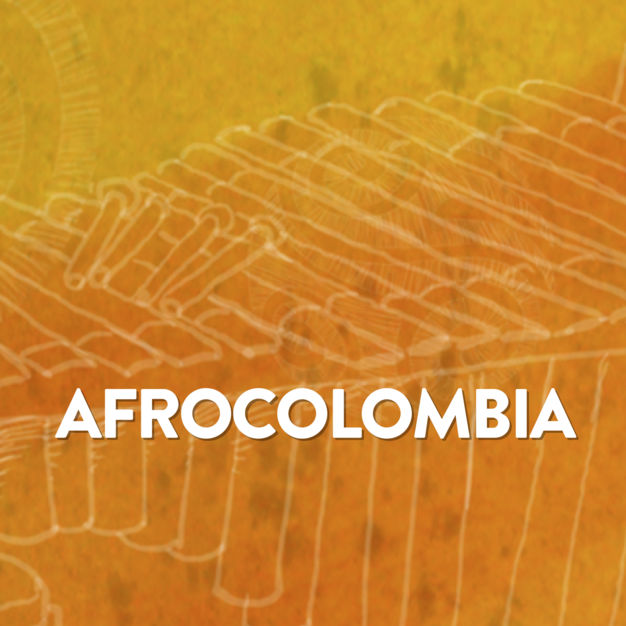
Colombia Calling - The English Voice in Colombia
Overseas Radio Network
Colombia Calling is your first stop for everything you ever wanted to know about Colombia. Interviewing experts in the travel industry, dealing with security issues and explaining the cultural nuances of this newly fashionable destination, Colombia Calling is hosted by Anglo Canadian expat Richard McColl.
- 53 minutes 2 seconds548: Jazz for Peace with Rick DellaRatta
Well, where to start with this interview?! It's that time of year when we endeavour to discuss more hopeful and positive episodes and then an email hit my inbox from Rick DellaRatta and Jazz for Peace. And thus the episode came into being. Rick DellaRatta is a multi instrumentalist, pianist, composer and founder of Jazz for Peace and we discuss what can be done to try and use music as a common ground for good. Rick shares the story of how Jazz For Peace began and what he is doing with it, We discuss Colombia, Brazil, India and then Rick plays some jazz on his keyboard live for us during the episode, can you guess the tracks (only available on YouTube: )? Check out: jazzforpeace.org
10 December 2024, 3:30 pm - 41 minutes 52 seconds547: Tu Fiel Amigo, Colombia: the Colombia Calling podcast Christmas Appeal 2024
We've never done this before, but heck, why not?! So, here is the first ever Colombia Calling Christmas Appeal in our 11 plus years of being on the air. Cartagena Paws and their supported Foundation of Tu Fiel Amigo in Cartagena have been on our radar for some time and a certainly deserving of some welcome help. We speak to Maureen Cattieu about the work of Cartagena Paws and Tu Fiel Amigo. Cartagena is home to nearly 400,000 street animals and the population is ever growing. As a way to help combat the overpopulation and contagious illnesses, Cartagena Paws has begun conducting large scale spay and release clinics, in addition to vaccine clinics in and around Cartagena. Spay and Neuter clinics serve two purposes: wide scale vaccination of both pets and strays and spay/neutering of stray animals. Maureen Cattieu founded Cartagena Paws in 2015, when she was living and teaching abroad in Cartagena, Colombia. Maureen spent over 10 years in Colombia working to help save the animals on the streets while focusing her instruction in the classroom on teaching empathy and compassion for all animals and living things. She currently lives and teaches in Key West, Florida, but continues to run Cartagena Paws, Inc. to the fullest of her abilities and saves countless lives throughout the years. She is dedicated to continuing out her lifelong mission to create positive change and awareness in the community and construct the first ever Educational-Based Animal Rescue Center in Cartagena, Colombia. There's WishList of Amazon if you feel like contributing. https://www.amazon.com/hz/wishlist/ls/3C93C87TISSII?ref_=wl_share
3 December 2024, 3:30 pm - 1 hour 1 minute546: Torah Tropical in Cali: How Far Would You Go to Find God?
The journey of making Torah Tropical began in 2021, in the midst of Colombia’s historic civil unrest. Despair at the Duque government’s policies and botched implementation of the Peace Process boiled until erupting into the tumultuous National Strike of April 2021. The uprising was the defining moment for a generation of young Colombians, a time those of us in the streets remember as an expression of hope, of a shared dream for a just society where a young person can aspire to a fulfilling, violence-free life. So, this week, we speak to Ezra Axelrod and David Restrepo about this new documentary and what making it meant to them and where it took them and the protagonists in terms of the great questions in life, religion, identity and place. Description of the Documentary: In a tropical paradise turned dystopian by the Drug War, a struggling Colombian family in the city of Cali, reinvent themselves as Orthodox Jews who believe God is calling them to the Promised Land. Over the course of year in which reality and religious parable collide, they risk everything in an attempt at making Aliyah to Israel, putting their faith and family to the ultimate test. Torah Tropical tells the universal story of searching for identity and belonging in the face of adversity. Through Isska and Menajem’s struggle to give their daughters a better life, the consequences of economic, racial and religious exclusion are explored with poetic intimacy, inviting audiences to fall in love with a family that defies stereotypes and inspires us to find hope in the middle of the world’s cruelest intersections. https://www.torahtropical.com
26 November 2024, 3:30 pm - 1 hour 14 minutes545: South America's Hidden Histories, a conversation with author Laurence Blair
'Romantic, adventurous and thrilling ... remarkable' Telegraph 'Vivid, fast-paced and wonderfully ambitious … Patria teems with alternative stories of a continent’s life and peoples' New Internationalist In late 1869, Richard Francis Burton stepped ashore in Southampton, fresh from a sightseeing tour of bone-strewn South American battlefields. The most lethal conflict ever fought on the continent was still stumbling to its gory conclusion. But if the celebrity adventurer expected to be mobbed with reporters, he was disappointed. Burton was ‘mortified’ to perceive how oblivious his fellow Britons were to ‘perhaps the most remarkable campaign fought during the present century’. Tales of Dr Francia – Paraguay’s dour, iron-willed dictator for almost thirty years – had once piqued the public’s curiosity. But the country had since ‘dropped clean out of vision. Many, indeed, were uncertain whether it formed part of North or of South America.’ He found ‘blankness of face’ whenever Paraguay was mentioned, ‘and a general confession of utter ignorance and hopeless lack of interest’. Over 150 years later, the amnesia persists. If South America is a forgotten continent, Paraguay has fallen off the map altogether. Foreigners often confuse it with Uruguay, in many ways – a secular, liberal, World Cup-winner – Paraguay’s opposite. The world takes Paraguay’s drugs, beef, soybeans, migrant labourers, cleaners and midfielders, but has blanked out their distant source. In London, Madrid or New York, this might be understandable. But Paraguayans have long felt isolated and ignored even by their neighbours. In an aphorism so often repeated it has taken on the character of a curse, Augusto Roa Bastos – the country’s most famous novelist – described his nation as ‘an island surrounded by land’. So, we discuss and end up philosophising about Latin America's place in the world, Lawrence's adventures across the region, Colombia, Paraguay and his new book, "Patria, Lost Countries of South America." https://www.penguin.co.uk/books/435719/patria-by-blair-laurence/97818479246…
19 November 2024, 3:30 pm - 1 hour 6 minutes544: Gringo Tuesdays arrives in Cartagena
It has become a cultural phenomenon in Colombia, beginning first in Bogota before branching out to Medellin, Cali, Lima (Peru) and now Cartagena...everyone knows all about Gringo Tuesdays. So, this week, coinciding with the launch of Gringo Tuesdays in Cartagena, we speak to co-founder Travis Crockett about how the business has grown, the differences in running events in each location, how they survived Covid and where they plan to expand to next...hint, two more overseas locations. This is a good news story about some entrepreneurs that took a punt on an idea and it worked, becoming one of the most unmissable nights for language exchange and then latin-style partying in Colombia. Tune in to hear about "bio pong," yes, you read that right, not "beer pong," but "bio pong," and other anecdotes from 13 years of running Gringo Tuesdays. We wish them all the best on this next venture in Cartagena. The Colombia Briefing is reported by Grace Brennan. https://www.gringotuesdays.co and support us https://www.patreon.com/colombiacalling
12 November 2024, 3:30 pm - 1 hour 7 minutes543: Returning to Macondo
After nine years away, Tim Buendia, has made it back to the town of Aracataca - birthplace of Gabriel Garcia Marquez - and it seems timely with a new series based on the author's opus: "One Hundred Years of Solitude" due to be aired on 11 December 2024 on Netflix. Tim, an adopted son of Aracataca, is perhaps singlehandedly responsible for his tireless work in bringing international tourism to the birthplace of Gabriel Garcia Marquez, the Colombian Nobel Prize winning author. And it was all falling into place with tours, a steady stream of visitors and significant press coverage...and then he left. We discuss what this return to "Macondo" or Aracataca means to Tim, how he has been working diligently in the interim years to continue promoting Aracataca, about his poetry and a new art gallery he is inaugurating in the town. Check out the website: https://www.thegypsyresidence.com The Colombia Briefing is reported by Emily Hart.
5 November 2024, 3:30 pm - 1 hour 36 seconds542: Total peace, totally reimagined - Nonviolent Communication in Colombia
Hello and welcome to another episode of Colombia Calling – I’m Emily Hart and this week we have something a little bit different – the radical linguistic technique which is building peace - personal and political - all over the world, and the inspiring woman bringing it to Colombia.
This week, I have with me Camila Reyes Azcuénaga – the founder of Resuena, the organisation bringing the school of thought known as ‘Nonviolent Communication’ (NVC) to Colombia, a way of structuring our thoughts and communications to prevent and heal conflict, breaching the divides of culture, politics, and identity.
Developed in the late 20th Century by psychologist Marshall Rosenberg, NVC now has trainers and centres in more than 60 countries around the world. This simple technique aims to humanise the ‘other’, and forge communication, collaboration, and trust – from our daily life, to our work, and well beyond.
Camila studied law and political science and worked with indigenous communities and landmines here in Colombia, but felt the country needed a more fundamental change than she could achieve with that work. She left Colombia in search of something which would shift the paradigm of violence and conflict entirely.
After stumbling across Nonviolent Communication training during Occupy Wall Street, she felt she’d found what she was looking for – she spent years training and finally returned to Colombia, founding Resuena in 2011, running free workshops for years.
Resuena has now trained thousands, from institutions like the United Nations, the Truth Commission, and the Search Unit for Missing Persons, to grassroots social leaders in conflict-stricken areas of Colombia’s South-west. The group helps people to navigate interpersonal relationships and conflicts, as well as maintain cohesion within movements and groups.
Through guided discussions, participants are trained to identify the patterns of behaviour that divide them and weaken their collective campaigns and processes, and then to replace them with a focus on acting from common ground. This year, Resuena also launched the ‘Sowers of Nonviolent Communication’ network – so that trainees can go into their own communities and pass on the training.
So today, Camila is going to give us a masterclass in these techniques and their underlying ideas, talking us through the four steps – observation, feeling, need, and request – along with some everyday examples. She’ll then tell us about her amazing work in some of Colombia’s most difficult contexts, and why this work is so necessary not just for the country – but for all of us.
29 October 2024, 2:30 pm - 49 minutes 19 seconds541: COP16 in Cali: Looking at Deforestation in Colombia
On Episode 541 of the Colombia Calling podcast, and given the current COP16 in Cali, we revisit our conversation with special guest Ole Reidar Bergum - Counsellor for Climate and Forests/ Consejero de Clima y Bosque - Royal Norwegian Embassy in Bogotá, who joined us to speak in-depth and openly about the tragedy of the rampant deforestation taking place at the moment in Colombia. We discuss the causes and results and what the Norwegian government, along with other collaborators, are trying to do to prevent an area the size of Bogotá being deforested each year. The Colombia Briefing is reported by Emily Hart. Be sure to check out her substack: https://substack.com/@ehart
22 October 2024, 2:30 pm - 49 minutes 14 seconds540: Why You Should Consider Colombia for Medical Tourism
Colombia stands out for its excellent healthcare and is rapidly becoming another destination for medical healthcare. Thinking of a tummy tuck, a hair implant, some dentistry or more? Take a look at the options, go through a reputable agency and take a holiday at the same time. This week, we speak to Kirby Braddell of Medical Tourism Packages, to talk about what is offered in Colombia. https://www.medicaltourismpackages.com/ The Colombia Briefing is reported by Grace Brennan.
15 October 2024, 2:30 pm - 1 hour 15 minutes539: Comparing politics and tourism in Nepal and Colombia
This week we get on the line to Naresh Dahal in Kathmandu to compare and contrast the tourism practices and politics in both Nepal and Colombia. Naresh is local travel specialist in Nepal and can assist with customising and tailor-making a tour and holiday suiting your travel needs, so he’s a man in the know. Whilst the countries may seem incredibly different from one another, we discover there to be some striking similarities as well. Join us for a pleasant conversation from Bogota to Kathmandu.
8 October 2024, 2:30 pm - 1 hour 1 minute538: From South London to South Bogotá
"South London has a serious problem with knife crime." This week we discuss how Henry May arrived in Colombia and ended up being a mover and shaker in the education world here. After a life-changing experience involving a tragedy relating to one of his students in South London, Henry questioned his life choices in education, leading him to consider other avenues. Read on to find out more about Henry. Henry May is a Social Entrepreneur from the UK currently living in Colombia where he currently serves as the CEO of Coschool, an education business focused on Social & Emotional learning in K-12 education. Henry has been recognised as a “rising star” of Colombian business by Dinero magazine and as “The teacher closing the inequality gap” by El Tiempo newspaper. Coschool is a social enterprise in Colombia that designs and implements methodologies for developing social & emotional skills in youth & teachers in the post-conflict country Henry's Coschool seeks to generate an impact on people through its programs, strengthening socio-emotional skills, contributing to their well-being and empowering them as agents of change. Coschool was selected by HundrED as one of the top 100 innovative global organizations that are transforming education through their proposals in 2020 and 2021. Located in Finland, HundrED seeks to spread ambitious and pedagogically sound innovations. In Latin America, only 8 projects were chosen, 2 of them from Colombia. Coschool was selected for being a pioneer and for its ability to create a scalable impact. https://coschool.co The Colombia Briefing is reported by Emily Hart.
1 October 2024, 2:30 pm - More Episodes? Get the App
Your feedback is valuable to us. Should you encounter any bugs, glitches, lack of functionality or other problems, please email us on [email protected] or join Moon.FM Telegram Group where you can talk directly to the dev team who are happy to answer any queries.
 Latin America in Focus
Latin America in Focus
 Cultura, contracultura y recontracultura
Cultura, contracultura y recontracultura
 Realidad Colombia
Realidad Colombia
 The Expat Files: Living in Latin America
The Expat Files: Living in Latin America
 Afrocolombia
Afrocolombia
 Colombia Digital
Colombia Digital